Patrick DeCorla-Souza, Tolling and Pricing Program Manager, FHWA
Lee Munnich, Humphrey Institute, University of Minnesota
Bruce Schaller, New York City Department of Transportation
John Doan, SRF Consulting
Center for Innovative Finance Support
Federal Highway Administration
Second Part of a Webinar Series on Road Pricing Outreach
FHWA - Center for Innovative Finance Support Road Pricing Public Acceptance and Outreach Webinar Mini-Courses
Moderator:
- John Doan, SRF Consulting
Presenters:
- Patrick Decorla-Souza, Tolling and Pricing Manager, FHWA
- Lee Munnich, Humphrey Institute, University of Minnesota
- Bruce Schaller, New York City Department of Transportation
- John Doan, SRF Consulting
Audience Q&A:
- Type questions into the chat box. The moderator will field your question to the appropriate panelist. Questions will be answered at the end of each session and during the last 15 minutes of the webinar.
Presentation Outline
- Communicating with stakeholders (Patrick DeCorla-Souza)
- Public perceptions and congestion pricing (Lee Munnich)
- New York City experience (Bruce Schaller)
- Case study (John Doan)
Part 1 Communicating with Stakeholders
Patrick DeCorla-Souza,
Tolling and Pricing Program Manager,
FHWA
Equity Concerns - Types of equity concerns
- Income-based
- Modal
- Geographic
- Fairness (paying twice)
Income-Based Equity
Social Justice Advocacy Groups' concern:
This will be a regressive tax on those who can least afford it.
New Priced Lanes: Equity Concerns
- Tolls require a larger share of the income of low-income commuters.
- So lower-income drivers use priced facilities less often
- This creates an equity issue ("Lexus lanes")`

Share of Income Spent on Tolls
$2.00 bridge toll on SR 520 bridge
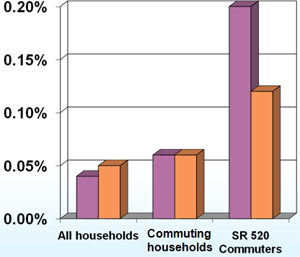
Addressing Equity Concerns
- Addressing income-based equity:
- Improved and/or lower cost transit service
- Toll credits or discounts for means-tested drivers
- Reimbursements of the amount of toll above the transit fare (NYC)
- Convenient ways for the "unbanked" to pay
- Modal Equity
Modal Equity
Transit Advocacy Groups' Concern:
Congestion relief will encourage choice transit riders to abandon transit and go back to their cars.
Transit and Congestion Pricing
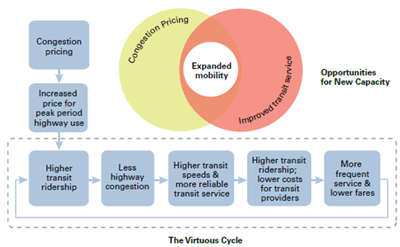
Addressing Modal Equity Concerns
- Addressing Modal Equity:
- Dedicate some of toll revenue to transit (San Diego, Minneapolis)
- Provide free or discounted service for carpools (HOT lanes)
Geographic Equity
Local residents' concerns:
Why do I have to pay for my road, when my tax dollars went to pay for the other guy's road?"
Region-wide Approach
Long-Range Planning:
- Incorporate road pricing into long-range planning
- All regional residents share in the burden
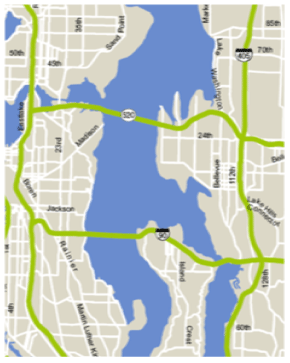
Region-wide Approach vs. "Patchwork"
Affordability:
- Lower tolls can be charged, since the financial burden is spread over more drivers
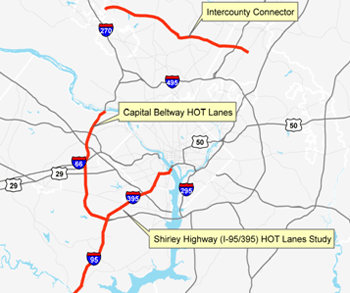
Efficiency:
- Tolls on only improved facilities will lead to sub-optimal use in off-peak
- Discourages use in off-peak
- Causes diversions to free facilities
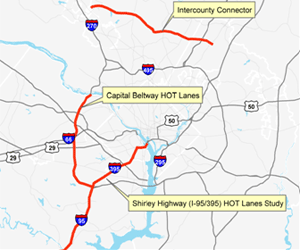
Paying Twice
Motorist Advocacy Groups' Concern:
Why impose tolls on existing free roads already paid for with taxes?
Construction Cost of New Lanes
- Providing "free" new capacity is financially unsustainable
- Fuel tax receipts from peak trips are less than 6% of capital cost for constructing a new lane
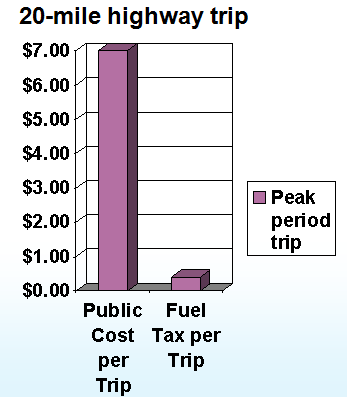
Construction Cost per Peak Trip
Costs in Major Urbanized Areas |
Normal Cost |
High Cost |
Highway construction cost/ lane mile* |
$13.4 M. |
$55.9 M. |
Daily traffic volume in peak periods (5-6 hours/day) |
10,000 vehicles |
10,000 vehicles |
Const. cost per vehicle per mile |
$1,340 |
$5,590 |
Const. cost for 20-mile round trip |
$26,800 |
$111,800 |
Annualized const. cost for 20-mile trip** |
$1,742 |
$7,267 |
Cost for 20-mile trip per working day |
$7.00 |
$29.00 |
Gas tax paid for 20-mile trip (2 cents/mile) |
$0.40 |
$0.40 |
*Source: FHWA, in 2006 dollars
**Annualization factor 0.065 assuming a 5.25% discount rate and 30-years
Costs for Reconstruction per Trip
Costs in Major Urbanized Areas |
Average Cost |
Cost per lane mile* |
$6.7 M. |
Daily traffic volume (24 hours) |
20,000 vehicles |
Reconstruction cost per vehicle per mile |
$335 |
Reconstruction cost for 20-mile round trip |
$6,700 |
Annualized cost for 20-mile trip** |
$436 |
Cost for 20-mile trip per day |
$1.20 |
Gas tax paid for 20-mile trip (2 cents/mile) |
$0.40 |
*Source: FHWA, in 2006 dollars
**Annualization factor 0.065 assuming a 5.25% discount rate and 30-years
Taxes vs. Tolls
Trucking Advocacy Groups' Concern:
Why not just raise taxes - they are less expensive to collect than tolls.
Taxes vs. Tolls: Congestion Delay
- Rush hour tolls reduce traffic
- A 10-14% reduction in traffic results in an 80% reduction in travel delays
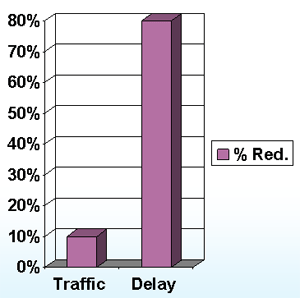
Source: The Louis Berger Group Inc. Examining the Speed-Flow-Delay Paradox in the Washington, DC Region: Potential Impacts of Reduced Traffic on Congestion Delay and Potential for Reductions in Discretionary Travel during Peak Periods, 2009.
Benefits to Governments and Public
Government services:
- Investment: Reduces new capacity needs
- Emergency services: Not stuck in traffic
Societal benefits:
- Economic: Improves freight transportation productivity
- Environment: Reduced greenhouse gases and improved air quality
- Community: Encourages use and development of alternative modes
Part 2 - Public Perceptions and Congestion Pricing
Lee Munnich, Humphrey Institute,
University of Minnesota
Citizens Jury
- In 1995, the Humphrey Institute conducted a week-long Citizens Jury with 24-randomly selected citizens from the Twin Cities area.
- Although the Citizens Jury voted 17-7 against congestion pricing as a way to manage congestion and fund transportation, the exit survey was quite enlightening.
- While 16 opposed congestion pricing, 18 of the 24 were open to considering congestion pricing as an effective solution in the future. Their primary concerns were
- Congestion not bad enough yet,
- Congestion pricing not fair - Lexus Lane concern,
- Congestion pricing costs too much - raise gas tax instead; and
- Congestion pricing won't work.
Should Minnesota consider congestion pricing in the future?
Citizens Jury Exit Survey
- 25 percent were solidly against congestion pricing
- 33 percent were in favor of congestion pricing
- 42 percent were opposed to congestion pricing but open to consideration if their concerns were addressed
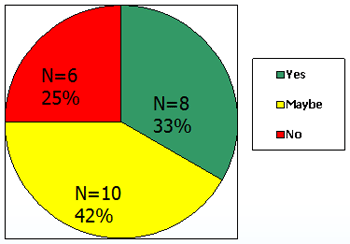
Loss Aversion
- In behavioral economics and decision theory, loss aversion refers to people's tendency to strongly prefer avoiding losses to acquiring gains.
- Behavioral studies suggest that losses are twice as powerful, psychologically, as gains.
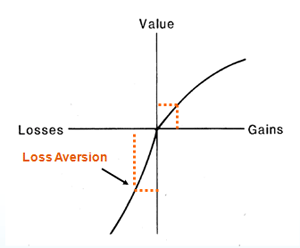
Source: Amos Tversky & Daniel Kahneman. "The Framing of Decisions and the Psychology of Choice"
Science, New Series, Vol. 211, No. 4481. (Jan. 30, 1981), pp. 453-458.
CURACAO
- A European study of congestion pricing, CURACAO (2008), found that based on European congestion proposals and projects, the public tends to be open to congestion pricing when discussed generally but becomes more opposed to congestion pricing as projects move closer to implementation.
- Referenda on congestion pricing before implementation have failed miserably - 75 percent against in Edinburgh, Scotland and 78 percent against in Manchester, England.
- However, projects that were implemented in London and Stockholm in spite of public opposition resulted in high levels of public support after implementation and are still in operation.
Public Support for Congestion Pricing
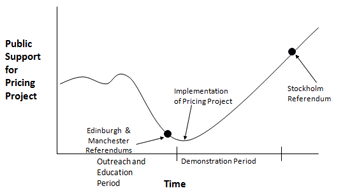
Source: CURACAO State of the Art Interim Report, April 26, 2008. p. 94, http://www.curacaoproject.eu/state-of-the-art-report.php
Part 3 - New York City Congestion Pricing
Bruce Schaller
Deputy Commissioner, Planning & Sustainability
New York City Department of Transportation
NYC Congestion Pricing Proposal (Jan. 2008)
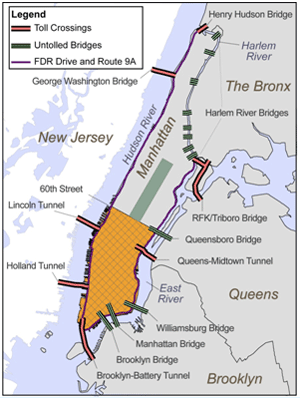
Distinguishing attributes of NYC experience
- Required approval of City Council and State Legislature
- Provided three opportunities for opponents to block proposal
- Priced existing capacity
- No free driving alternative
- Everyone entering zone must pay; contrasts with HOT lanes
- MTA credibility issues affected public perception of transit as a viable alternative to driving
Summary of views on congestion pricing
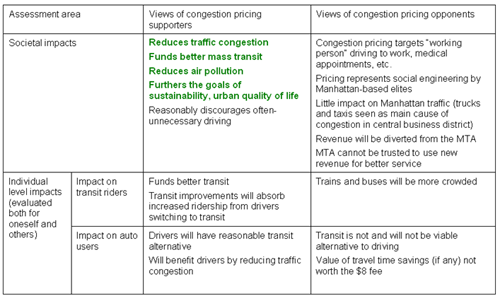
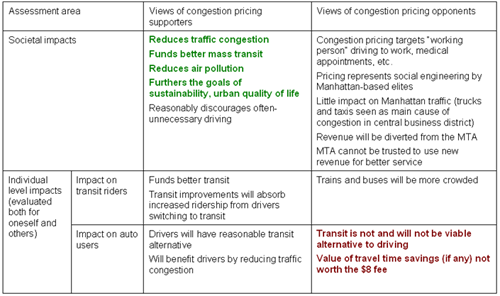
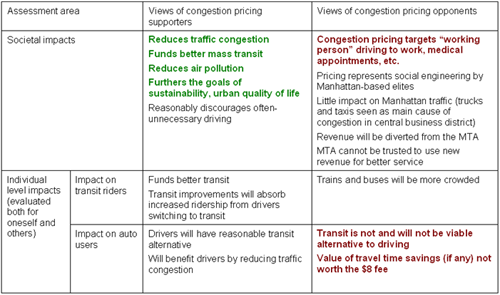
Lessons Learned
- Importance of vision and top-level leadership
- Pricing part of comprehensive plan that includes improved transit service, and served transportation, climate change and land use goals
- Public involvement shaped the final plan
- Extensive public outreach and education critical
- Leadership from civic, business, environmental and advocacy groups
- Availability of federal funding ($354m UPA)
- Public engagement should shape program design.
- Pricing must provide value proposition to those who will pay
- Particularly challenging when all drivers entering a cordon will pay
- Need clear rationale why some drivers pay and others do not
- Need to demonstrate delivery of benefits (reduced congestion, improved transit)
Part 4 - Group Discussion
John Doan - SRF Consulting
For More Information
- FHWA Center for Innovative Finance Support :
www.fhwa.dot.gov/ipd
- FHWA Office of Operations:
https://ops.fhwa.dot.gov/tolling
pricing/
- Webinar Mini-Courses:
http://regionalities.hhh.umn.edu/
Contact Information
- Patrick DeCorla-Souza
Tolling and Pricing Program Manager
Center for Innovative Finance Support
Federal Highway Administration
Department of Transportation
1200 New Jersey Ave, SE
Washington, DC 20590
(202) 366-4076
Patrick.DeCorla-Souza@dot.gov
- Lee Munnich
Senior Fellow and Director
State and Local Policy Program/Hubert H. Humphrey Institute of Public Affairs
280 Humphrey Center
301 19th Avenue South
Minneapolis, MN 55455
(612) 625-7357
lmunnich@umn.edu
- Bruce Schaller
Deputy Commissioner for Planning & Sustainability
New York City Department of Transportation
55 Water Street, 9th Floor
New York, NY 10041
(212) 839-6662
bschaller@dot.nyc.gov
- John Doan
Senior Associate
SRF Consulting Group, Inc.
1 Carlson Parkway, Suite 150
Minneapolis, MN 55447
(763) 249-6750
jdoan@srfconsulting.com
What's Next?
- Session 3: Integration with the Planning Process and Outreach Strategies for Project Deployment
- September 28, 2:00-4:00 PM EDT
- Presenters: Charlie Howard (PSRC), Patty Rubstello (WSDOT), Rob Fellows (WSDOT), Patrick DeCorla-Souza (FHWA), Wayne Berman (FHWA), John Doan (SRF Consulting)
- Registration and more information: http://regionalities.hhh.umn.edu/














